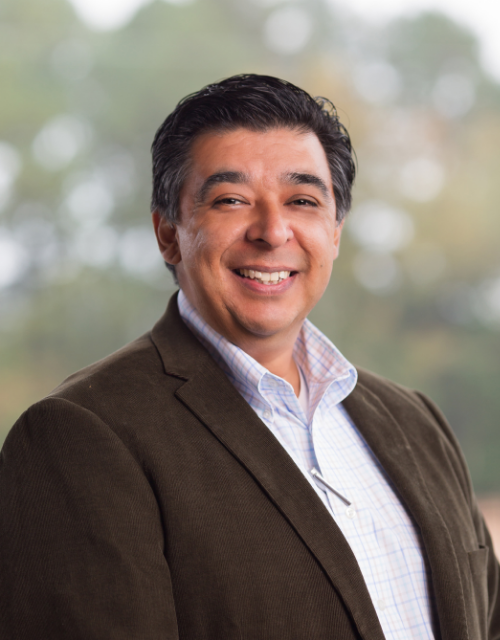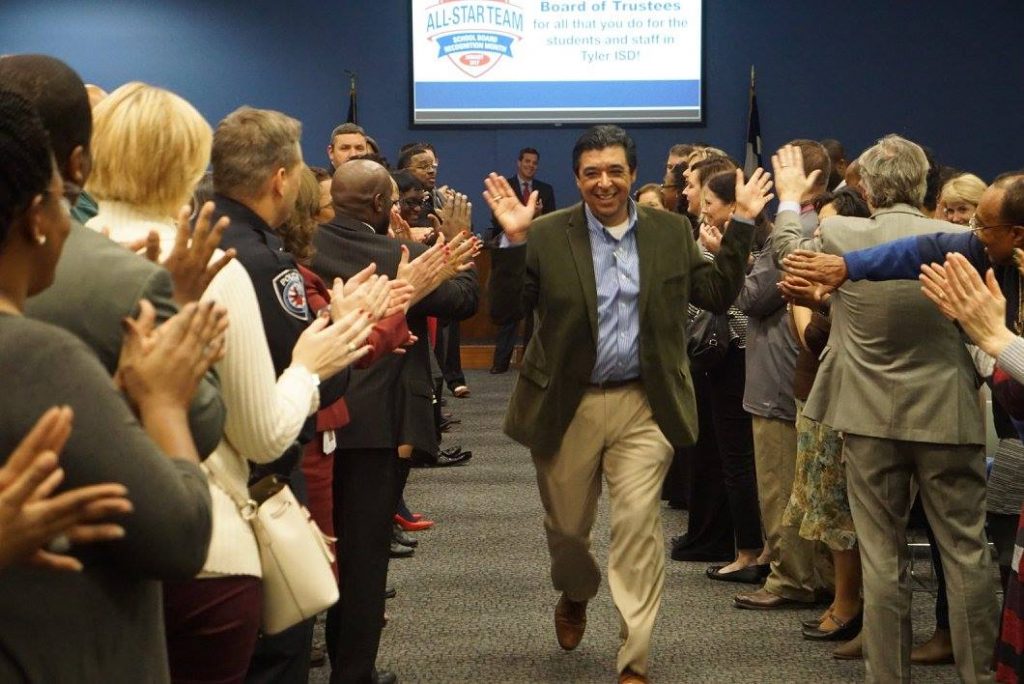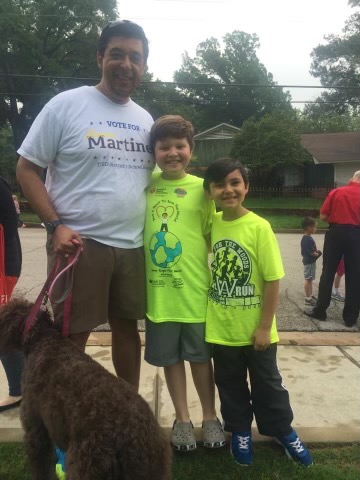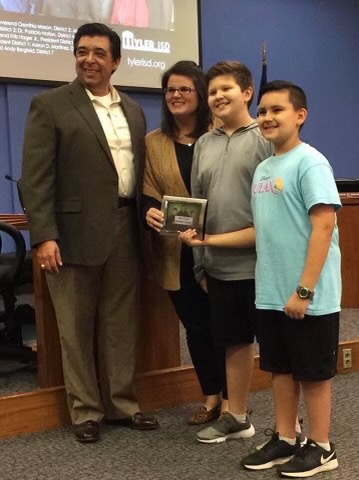With the Tyler ISD School Board of Trustees election coming up in May, incumbent Aaron Martínez will be on the ballot for district 5 with newcomer Alejandro Gauna. The Tyler Loop’s Zoe McGhee spoke with both Martínez and Gauna in-depth. You can find her conversation with Gauna here.
A school board veteran with six years under his belt, Martínez believes Tyler ISD needs experienced leadership right now, and that he’s the man for the job.

Here, Martínez tells The Loop how the past six years have developed trust and skills as a Tyler ISD trustee. He hopes for the opportunity to continue working on long-term goals and expanding student achievement.
Early voting for the election begins on April 19 through 27, with election day on May 1.
Why rerun for the Tyler ISD board of trustees?
The short answer is we need experienced leadership. The stakes are too high right now. That’s why I’m running. The pandemic has put a strain on student achievement, put a strain on the state budget. It has put a strain on our own educational infrastructure moving forward. When you take all those into account as a parent and a father of two students, I think that, for me, I would want someone that has been there before to address a lot of these issues.
So far in your service as a trustee, what moments or achievements make you most proud?
There’s several, obviously. This board hasn’t shied away from important topics. If you go back to the federal desegregation order achieving unitary status is a big one. Certainly the 2017 high school bond was huge. That has potential to impact our city in really great, amazing ways.
Our progress with student achievement is by far, one of my favorite things. When I first got on the board, there were 11 schools on the TEA’s improvement required list. And in 2019 we were rated a ‘B’ district. Certainly student achievement is by far the best thing that we’ve done over the course of the last several years.

What have been the biggest challenges that your district faced during your term so far? And what new challenges do you predict moving forward?
I think the perspective we take as a board is less about our individual districts, although that’s where we have to go to get votes. But most of us view the district as a whole and try to do best for all kids.
It’s less about the students in, say, district five or district two or our individual districts When I think back about all the challenges we’ve had, student achievement was the biggest one.
And it’s still something that we set goals on early literacy because we’re trying to make a tremendous impact on that. It’s still the one thing that drives everything that we do. But when you talk about challenges moving forward, it’s some of the same stuff: trying to get our young readers reading and trying to get kids graduating with a college or career path.
Certainly COVID-19 has made at least the immediate future a bit challenging to assess where we are now after kids being out of school last year. That’s certainly something that in the immediate future, we are still trying to figure our way through and navigate.
Long-term, there’s still a couple of old campuses that we have to fix. Whether we get to that in this next term over the next three years, I don’t know. But certainly there are some long-term goals that we’ll have to address with respect to facilities and what our plans are moving forward with those.

I also saw that you served in numerous nonprofit roles such as the East Texas Food Bank and Tyler Young Life within the community. How has serving in these various organizations given you perspective in issues that you faced in the past?
There’s a couple of roles that I really liked serving in. I really enjoy my work at the food bank. They did a great job stepping up over the last year, when people were really needing food and things got tight. They were able to really pull through and do some awesome stuff. And the community was super generous in their giving to that organization over the course of the last year, which has been awesome.
It’s given them the opportunity to fulfill their mission, which is feeding people. There’s certainly having that perspective of the food insecurities not just in our community but in our schools. That is certainly something that has had a tremendous impact on my perspectives as a trustee and just of our community as a whole.
Some of the strategic work I do on the Leadership Tyler board has been really great, taking a strategic view of our city and our community and where we want it to go and how we need to be developing leaders to do those things.
And I’m involved with Tyler Young Life, an organization that ministers to students in our schools. And obviously you can tell that I have a tremendous heart for the kids in our schools and our community as a whole.

How would you say that your heritage has shaped the way that you lead and address issues within a role, if at all?
When I speak to Latino and Hispanic groups, I try and remind them that there’s tons of different perspectives all defined as Hispanic culture or Latino culture.
But one thing we need to remember is Latin America’s huge and its people are extremely diverse. Because of that, our Latino leaders have a role and an opportunity to be bridge builders, to encourage collaboration and tolerance and create a willingness to work together.
I have tried really hard to do that. People seem to be really responsive to that with me and not just my Hispanic and Latino friends, my white and Black friends too. Everyone knows that I try and play that role.
You grew up in Texas, so I’m sure you’ve witnessed firsthand the ever evolving school system. What do you see as Tyler ISD next most important steps going forward?
That’s a challenge, right? Having the foresight to figure out what the Texas Legislature and Texas Education Agency and all of these groups that have a hand in what our school systems do, it’s very difficult to do. No one has a crystal ball, so you don’t really know what accountability is going to look like, funding is going to look like.We take the needs of our community and try and provide the leadership and the resources to achieve whatever that is.
As an example, we recently approved senior seminar, a class we’re going to make a requirement for seniors to take. In that seminar class will be financial literacy, communication skills, written skills, oral skills, conflict resolution, college and career planning. You hear what your community’s asking from you, and then you attempt to address those things.
The Career and Technology Center obviously is another example where we take what the community says, the types of workers the community has said that they need. We’ve attempted to give kids those skills by providing a different variety of classes ranging from medical introduction to medical professions or careers like welding and carpentry.
Having your pulse on what your community requests gives us an idea of what we can do moving forward.

As you mentioned earlier, you have two sons who attend Tyler ISD schools. How has this affected the way you address certain issues, if at all?
I wasn’t shy. Last time I ran saying that I wanted to be an advocate for our students, our families, because that’s the perspective that I had. That has evolved to a place where students and families are comfortable speaking to me or being honest with me or reaching out to me.
I’ve always tried to be accessible and I’ve always been willing to take any meeting request or any phone call. I hope I’ve proven that certainly I fight every day for students and families.
Why should you be elected? What is the ideal impact that you would wish to make?
To be perfectly honest, it’s taken me about this long to feel like I’m getting really good at this job. And now that I feel like I have, let’s see how much more I can do for kids. I think that’s what I would say. There’s so much more potential now. I am getting comfortable with all the different roles that you have to play in this job.
If you had one thing to pick for people to know about you, what would it be?
I guess it would be that I get up every day and try to do my best to make Tyler a little bit better, whether it’s on the school board or whether it’s in my non-profit work or in my day job. I think I’ve proven that the experience I have certainly has a tremendous amount of value.
Is there anything else that’s important to address that hasn’t come up yet? Is there anything that you would like for people to know or understand?
Yes, I think school boards are the last pure form of representative government. We’re volunteers, it’s nonpartisan and it’s non-partisan because sometimes doing the right thing for children doesn’t fit in a blue box or a red box.
Sometimes people forget that you need someone strong enough to evaluate what’s best for kids and make those hard decisions. I would say that we certainly need more leadership and less politics when it comes to the work we do.
Zoe McGhee is a junior at The University of Texas at Tyler studying Mass Communication. She is the managing, newsletter and copy editor for The Patriot Talon, the independent student-run newspaper designed to inform and entertain UT Tyler students and staff. McGhee is also part of The Tyler Loop’s newsletter staff.
Love what you're seeing in our posts? Help power our local, nonprofit journalism platform — from in-depth reads, to freelance training, to COVID Stories videos, to intimate portraits of East Texans through storytelling.
Our readers have told us they want to better understand this place we all call home, from Tyler's north-south divide to our city's changing demographics. What systemic issues need attention? What are are greatest concerns and hopes? What matters most to Tylerites and East Texans?
Help us create more informed, more connected, more engaged Tyler. Help us continue providing no paywall, free access posts. Become a member today. Your $15/month contribution drives our work.







